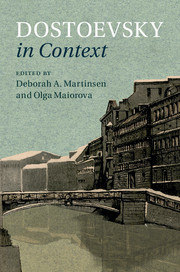Book contents
- Frontmatter
- Contents
- List of illustrations
- Notes on contributors
- Acknowledgments
- Note on citation, transliteration, glossary, and dates
- Chronology
- 1 Introduction: the many worlds of Dostoevsky
- PART I SOCIAL, HISTORICAL, AND CULTURAL CONTEXTS
- PART II LITERATURE, JOURNALISM, AND LANGUAGES
- 25 Modern print culture
- 26 Realism
- 27 Dostoevsky: translator and translated
- 28 Travel and travel writing
- 29 Folklore
- 30 Foreign languages
- 31 Theater
- 32 Dostoevsky's journalism and fiction
- 33 Dostoevsky's journalism in the 1860s
- 34 Dostoevsky's journalism in the 1870s
- 35 Censorship
- Glossary
- Further reading
- Index
- References
33 - Dostoevsky's journalism in the 1860s
from PART II - LITERATURE, JOURNALISM, AND LANGUAGES
Published online by Cambridge University Press: 18 December 2015
- Frontmatter
- Contents
- List of illustrations
- Notes on contributors
- Acknowledgments
- Note on citation, transliteration, glossary, and dates
- Chronology
- 1 Introduction: the many worlds of Dostoevsky
- PART I SOCIAL, HISTORICAL, AND CULTURAL CONTEXTS
- PART II LITERATURE, JOURNALISM, AND LANGUAGES
- 25 Modern print culture
- 26 Realism
- 27 Dostoevsky: translator and translated
- 28 Travel and travel writing
- 29 Folklore
- 30 Foreign languages
- 31 Theater
- 32 Dostoevsky's journalism and fiction
- 33 Dostoevsky's journalism in the 1860s
- 34 Dostoevsky's journalism in the 1870s
- 35 Censorship
- Glossary
- Further reading
- Index
- References
Summary
The literary journals did far more than provide a living, a publication outlet, and a stylistic framework for writers. They were also the chief source of information and attitudes, an arena in which writers and other literate people could learn more and absorb more culture than in any part of Russia's explicit system of education. The journals were a center around which writers would structure their social and literary identity.
The mid-nineteenth century was a time when Russian “thick” literary journals* were in their heyday. Proliferating after the death of the repressive Nicholas I (1825–55), journals provided an extremely rich, dynamic milieu for writers and critics alike. Before his imprisonment and exile in Siberia, Dostoevsky had been an active player in this milieu, and he was eager to return to it, not just as a contributor but as an editor and publisher himself. Dostoevsky had an abiding interest in current affairs and an intuitive sense of the higher, essential questions in the unfolding tapestry of Russian life, even those which seemed most trivial and transient. As a result of this gift for drawing the eternal out of the ephemeral, Dostoevsky valued journalism for its fruitful polyphony of views from fiction writers, critics, and readers. Journalism offered a natural fit for Dostoevsky's own creative method, in which his fiction and nonfiction writing informed and enhanced each other in terms of content, quality, and significance.
The publication history of Vremya (Time) and Epokha (Epoch)
In 1859, Dostoevsky returned to European Russia from his Siberian exile eager not only to join but to shape the discourse and debates underway. He and his older brother Mikhail, who was active in Russian literary circles even though his income was largely derived from a cigarette factory, had been corresponding about starting a literary journal. Permission had been granted in 1858, but the project was delayed for financial reasons. Once Dostoevsky had been granted permission to recommence journalistic activities, the new publication, entitled Time, was announced and subscriptions solicited in late 1860. The brothers agreed that as chief editor the more practical Mikhail should take care of the journal's business concerns, and they invited the critics Nikolai Strakhov and Apollon Grigoriev to join them as primary collaborators.
- Type
- Chapter
- Information
- Dostoevsky in Context , pp. 280 - 287Publisher: Cambridge University PressPrint publication year: 2016



